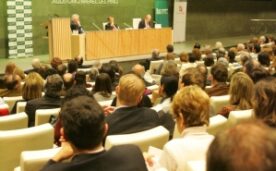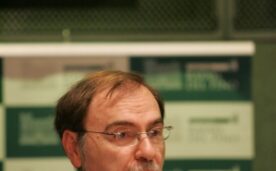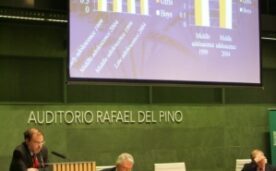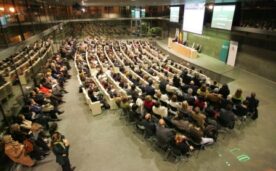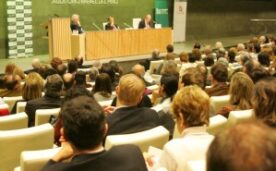The Rafael del Pino Foundation, in collaboration with the Lilly Foundation, hosted the Master Conference "Food and health: not only what and how much, but who and how", given by Professor José María Ordovás, on 9 February 2010.
José María Ordovás, director of the Genomics and Nutrition Laboratory at Tufts University (Boston) and scientific collaborator of the National Centre for Cardiovascular Research (CNIC), said: "Our current eating habits, characterised by the misalignment of schedules, mean that our clock does not keep time and at the same time they favour the appearance of diseases such as diabetes or obesity. In turn, mutations in clock genes can further increase the risk.
According to the latest research conducted by Professor Ordovás and his collaborators in Spain, "genetic mutations caused by chronological disruption influence a number of disease risk factors and even how different people respond to weight loss programmes". As this expert explains, "knowledge in biochronology will be combined with nutrigenomics to devise dietary recommendations that will help each of us to achieve not only a longer life but also a higher quality of life".
Chronological regulation, or chrono-regulation, is driven by a number of genes, the best known of which are CLOCK, PER2 or BMAL, which in turn regulate the genetic cascade that depends on their signals. Today, our habits - the hours we sleep or when we eat - are very much at odds with our genes and cause a chronological break. "In other words, a decoupling between what we do and what our biology is expecting us to do, causing metabolic stress that favours not only the onset of diseases such as diabetes, obesity and cardiovascular disease, but also infectious diseases and probably cancer, as well as moods," explained Professor Ordovás.
In addition to the time change, eating in a hurry is another factor that contributes to obesity. "One of its consequences is that we don't give time for the satiety signals to reach the brain, and therefore the brakes don't work and we eat more," explained the expert. Genes have adapted to the rhythm set by humans over hundreds of thousands of years. The disorder in eating, and other environmental contaminations such as having light 24 hours a day, is changing their rhythm. "We are confusing the genes and causing them not to function as and when they should, and therefore for us not to function optimally". Professor Ordovás predicted that "humans will adapt and those whose genes have mutations that favour these lifestyles will be selected and survive better".
"In the meantime, we must try to recapture and live the benefits that the Mediterranean lifestyle has for our genes," he said. In addition to its well-known nutritional balance, "another of the advantages of the Mediterranean diet is precisely its regularity", he said. As an example of our poor nutrition, he regretted that "sometimes we eat something high-calorie and not very nutritious before one of our main meals and this can break the cycle and make us not feel like a more traditional and nutritious meal, but it can also happen that we eat badly and overeat, leading to obesity".
That modernisation and Western lifestyle habits have unleashed rampant obesity in some populations is a well-known fact. However, research in nutrigenetics has uncovered the involvement of genes. "There are nations in the Pacific where the rate of obesity and overweight is 95%, and this has happened in the last 50 years. These populations had genes adapted over many generations to a very particular type of diet because of their isolation. The same has happened with American Indians and Latin American peoples when they have migrated to the United States or Spain, as these populations have "thrifty genes" (because food was traditionally scarce), whereas now they can obtain food easily.
Another example of genetic adaptation is the case of lactose intolerance, "completely natural and biological in the case of Asian, some African and even Mediterranean countries. However, in northern Europe, because of its greater dependence on dairy products, genes have adapted to that environment; the same can be said of carbohydrate or alcohol consumption.
